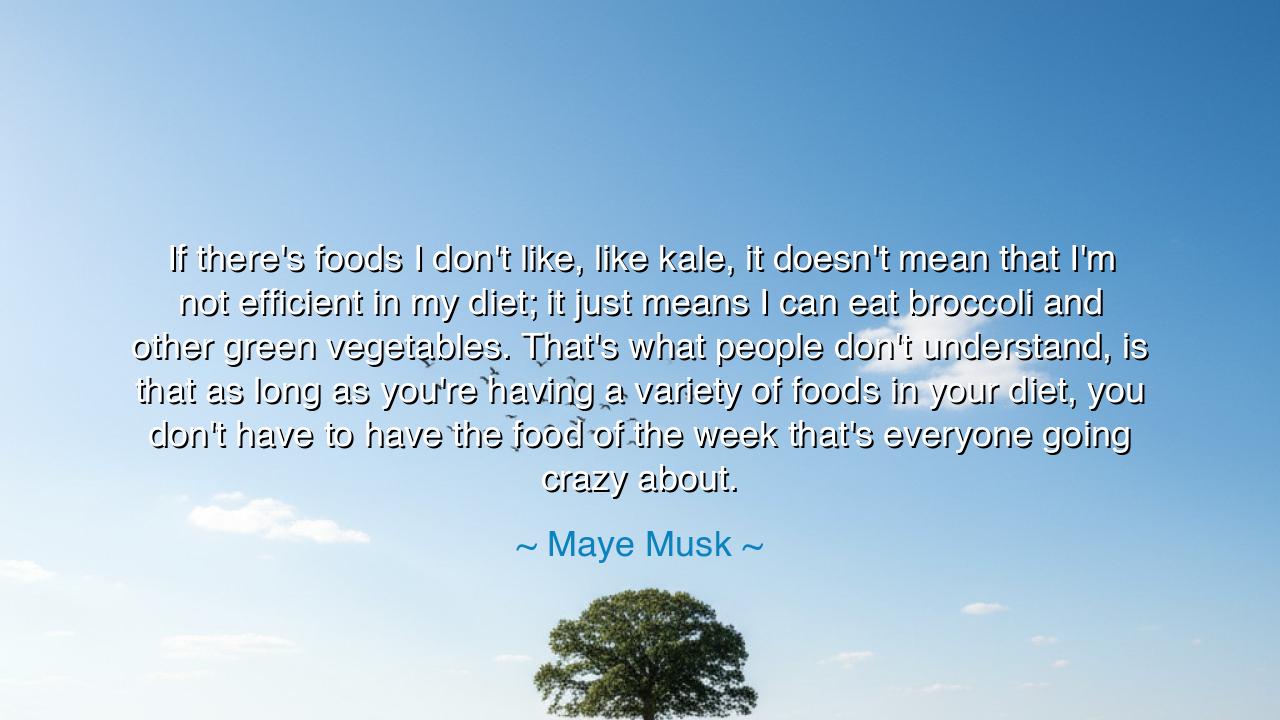
If there's foods I don't like, like kale, it doesn't mean that
If there's foods I don't like, like kale, it doesn't mean that I'm not efficient in my diet; it just means I can eat broccoli and other green vegetables. That's what people don't understand, is that as long as you're having a variety of foods in your diet, you don't have to have the food of the week that's everyone going crazy about.






In the wise and measured words of Maye Musk, a woman of both intellect and grace, we find a lesson that reaches beyond nutrition into the heart of balance itself: “If there’s foods I don’t like, like kale, it doesn’t mean that I’m not efficient in my diet; it just means I can eat broccoli and other green vegetables. That’s what people don’t understand, is that as long as you’re having a variety of foods in your diet, you don’t have to have the food of the week that everyone’s going crazy about.” Though her words may seem simple, they carry the weight of ancient truth — that health, wisdom, and fulfillment are not born of obsession, but of moderation, variety, and understanding.
Maye Musk, a model, dietitian, and mother of visionaries, speaks from both science and experience. Her message is a call against the modern idol of extremes — the worship of trends that promise miracles but bring imbalance. In her voice echoes the counsel of those who have lived long enough to see that truth rarely wears the robes of fashion. The obsession with a single “superfood” or the latest miracle diet is not new; it is the echo of an ancient human weakness — the desire for shortcuts to perfection. Yet Musk reminds us that strength lies not in restriction, but in variety — not in chasing what others praise, but in listening to the quiet wisdom of one’s own body.
The ancients, too, knew this. The Greek physician Hippocrates, whom the wise have called the Father of Medicine, once taught that the best diet is one of balance, drawn from nature’s diversity. “Let food be thy medicine and medicine be thy food,” he said, but he did not preach the virtues of one plant over another; he spoke of harmony — the dance between all things that nourish. Likewise, the Romans, who built empires yet prized moderation, followed the doctrine of temperantia, the virtue of self-restraint. They ate not to impress, but to sustain. In their wisdom, they saw that an excess of even good things can bring harm — just as too much sun burns the harvest it was meant to grow.
Maye Musk stands as a modern embodiment of this classical balance. When she says she does not eat kale, yet still thrives, she is rejecting not health itself but the false religion of health fads — those fleeting beliefs that sanctify a single food while ignoring the body’s greater symphony. Her words remind us that wellness is not achieved through imitation, but through understanding. To eat with wisdom is to know that the body, like the earth, flourishes through diversity. Broccoli, spinach, peas, or beans — each brings its own gift, each sustains a part of the whole.
History offers many tales of those who forgot this truth. In the courts of the Renaissance, kings sought alchemists who promised eternal youth through elixirs and singular foods. Yet it was the peasants — those who ate modestly, from the bounty of many crops — who often lived longer, their strength born of balance rather than indulgence. Even the sailors of old learned, through bitter experience, that a lack of variety brings ruin: those who ate only dried meat and bread suffered scurvy, while those who added citrus and greens found health restored. Thus the body itself testifies to Maye Musk’s wisdom — that life thrives through diversity, not through obsession.
But her words carry more than dietary counsel; they hold a lesson for the soul. Just as the body grows weak from monotony, so too does the spirit when it clings to a single idea, fashion, or dream. The one who follows only what others praise — the “food of the week” in any form — forgets the richness of their own path. True strength lies in the courage to choose what is right for you, even when the world applauds something else. In the quiet act of saying, “I do not need to follow every trend,” one reclaims the dignity of self-knowledge — the wisdom of balance that sustains both body and heart.
So let this be the teaching: seek variety, not extremity. Honor what nourishes you, and let go of what does not. Do not chase the glory of the moment, for it fades like mist before the morning sun. Instead, cultivate steadiness — the discipline to eat, live, and act in harmony with nature’s rhythm. Choose not what is loudest, but what is lasting. Drink water, eat the greens you love, rest when weary, and remember that health — like wisdom — is not a prize won by intensity, but a garden tended by balance.
For in the end, Maye Musk’s words echo the ancient harmony of life itself: that wholeness does not demand perfection, but peace. Whether you eat kale or broccoli, whether your table is humble or grand, it is the variety, the gratitude, and the moderation within that bring true vitality. Thus, live not by fashion, but by truth; not by frenzy, but by balance. And in doing so, you will find not only health, but serenity — the quiet, enduring strength of one who walks in rhythm with the wisdom of the ages.






AAdministratorAdministrator
Welcome, honored guests. Please leave a comment, we will respond soon